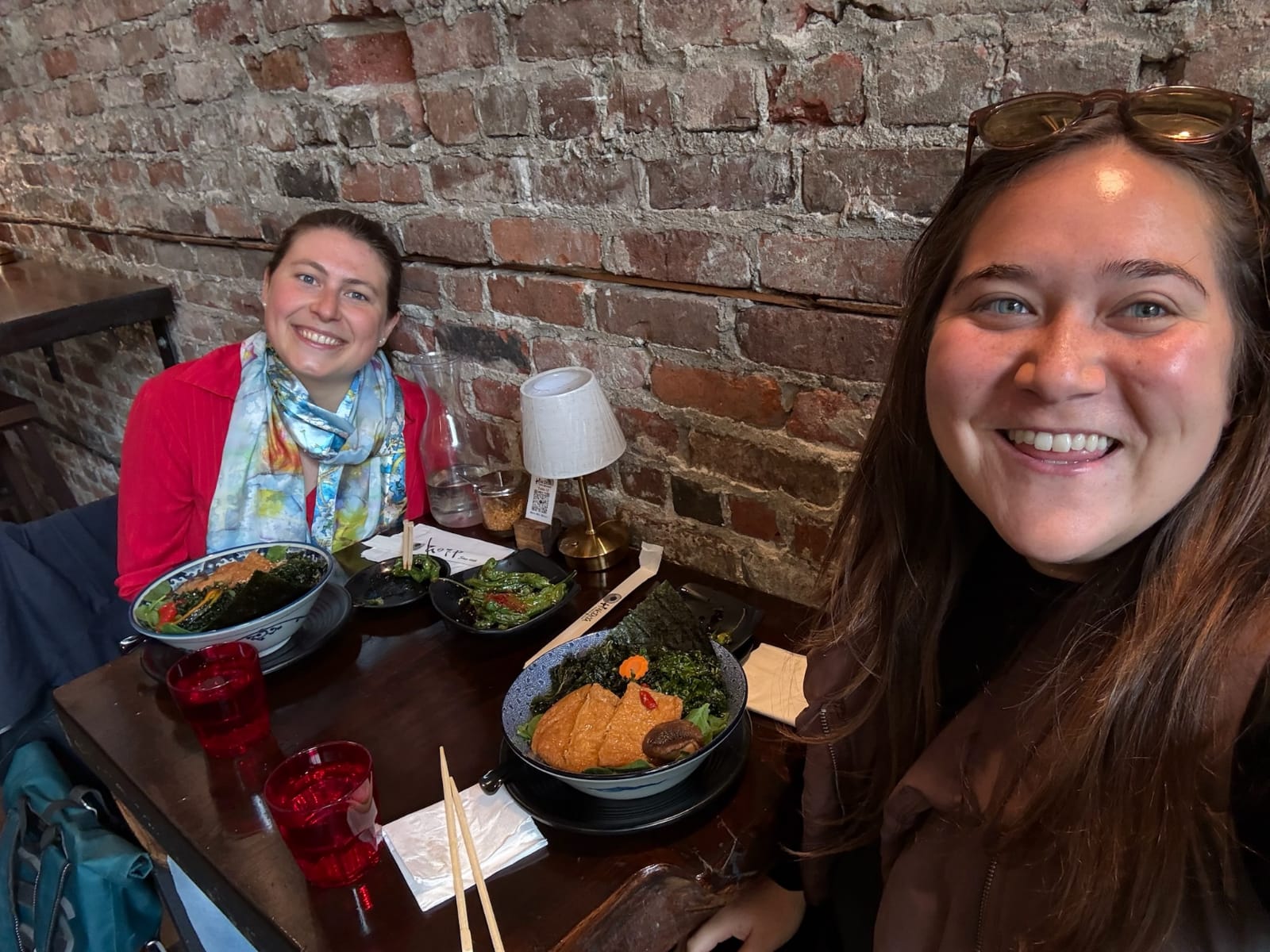– by Sarah Kakadellis, July 2025
As I reflect on my experience in FoodTech venture capital (VC) over the past six months, I see a parallel between entrepreneurship and my own journey landing the IIFH Innovator Fellowship: both are the result of serendipity, tenacity, and network cultivation.
A serendipitous encounter
A book club invite was all the bookworm in me needed. I was inspired by the dynamic conversations between MBA students, PhD candidates, and postdocs discussing the role of business, entrepreneurship, and science in the food system that unfolded at the IIFH book club meetings. These discussions reignited the question that originally led me to pursue my postdoc at UC Davis in the Spang lab: how can we best apply scientific endeavors in practice to exert real-world impact for the benefit of society?
This led me to explore opportunities in food tech, innovation, and entrepreneurship. I wanted to learn how best to apply my scientific research on food waste valorization and food sustainability to impart real-world impact.
Grit: passion x perseverance
Encouraged by my advisor and the IIFH community, I decided to apply to the IIFH fellowship program. Despite progressing through the recruitment stages with all three VC partners in that cycle, my application was ultimately unsuccessful. What then – acknowledge defeat and give up? No. Instead, I let the news sink in, sought feedback, and re-applied to the program in the following cycle. Grit proved not only a successful strategy – I was selected for the fellowship – but a particularly rewarding one, for the VC I was to join over the next six months strongly aligned with my values and goals.
As a women-led, early-stage venture firm, Supply Change Capital (SCC) invests in technology across the food supply chain – systems that people and our planet rely on every day. From automation that improves labor and safety to platforms that predict climate volatility and supply chain risk, they back the critical food infrastructure that no one sees but everyone needs. Their emphasis on sustainability and multiculturalism resonated with my scholarly work, with an ongoing collaborative research project with a non-profit in the Central Valley focused on developing and applying locally sourced food waste-derived fertilizers in historically underserved communities.
Cultivating your network
As I embarked on the VC journey, I had the opportunity to experience the ecosystem hands-on, including sitting through first calls and follow-ups with startup founders, conducting technical diligence, attending investor dinners hosted by SCC in San Francisco and Milwaukee, and engaging with like-minded people at FoodTech conferences in San Francisco, Boston, and Seattle.
One of the highlights of my fellowship was conducting interviews with industry stakeholders for a white paper and investment landscape map on sustainable packaging, while based in SCC’s Chicago office. Engaging in deeper and technical conversations at the intersection between science and innovation on the one hand and business and corporate strategy on the other, all while identifying emerging areas of interest and investable opportunities, was both a stimulating and valuable exercise. I gained a deeper appreciation of the challenges and opportunities in scaling sustainable solutions within business realities.
During my time in Chicago, I also got to travel to Boston – by train! A wonderful experience I highly recommend to anyone interested in slow and sustainable travel – to represent SCC at the Google Food Lab and identity new deal opportunities. This community of food leaders, change agents, and passionate individuals dedicated to building a sustainable and responsible future in the food and beverage space, highlighted the power of networking in driving innovative solutions.
From seed to exit
Moving forward, I would like to apply the learnings from the past six months as I transition away from academia out into the ‘real’ world. The conversations I have had planted a seed in my mind, and I am keen to explore opportunities that would allow me to continue being exposed to and support innovative solutions for a sustainable, equitable, and efficient food system. As a niche biochemist-turned systems-level researcher, I have cultivated a passion for bridging gaps between disciplines and applying a comprehensive approach to research. One of the biggest takeaways from this fellowship has been learning how to think through problems like an investor—balancing technical depth with big-picture strategy. Working alongside startups and seeing how different teams approach challenges has pushed me to become more flexible in how I communicate and collaborate. It’s also given me a clearer sense of how my scientific background can add value in fast-paced, early-stage environments.
In his history of the VC revolution The Power Law, Sebastian Mallaby challenges the notion that strong, lone entrepreneurs are solely responsible for successful ventures. Instead, he argues that the entire VC ecosystem play a significant role in nurturing, guiding, and shaping their success. Similarly, I want to acknowledge the people who have helped make this fellowship a successful journey.
I would like to express my gratitude to the SCC team for teaching me the ropes and supporting me over the duration of the fellowship: Shayna Harris, General Partner; Noramay Cadena, General Partner; Rachel Stinebaugh, Senior Associate; Grace Weinstock, Impact; Armand Dawkins, Platform, as well as former UC Davis fellows Minami Ogawa and Jake Gonzales. I am also thankful to my academic advisor, Dr. Ned Spang, Associate Professor in Food Science & Technology at UC Davis; Julie Morris, Director of the UC Davis Food & Ag Industry Immersion; and the IIFH Innovator Fellowship team, particularly Dana Armstrong Hughes, for encouraging and enabling me to take part in this program.
